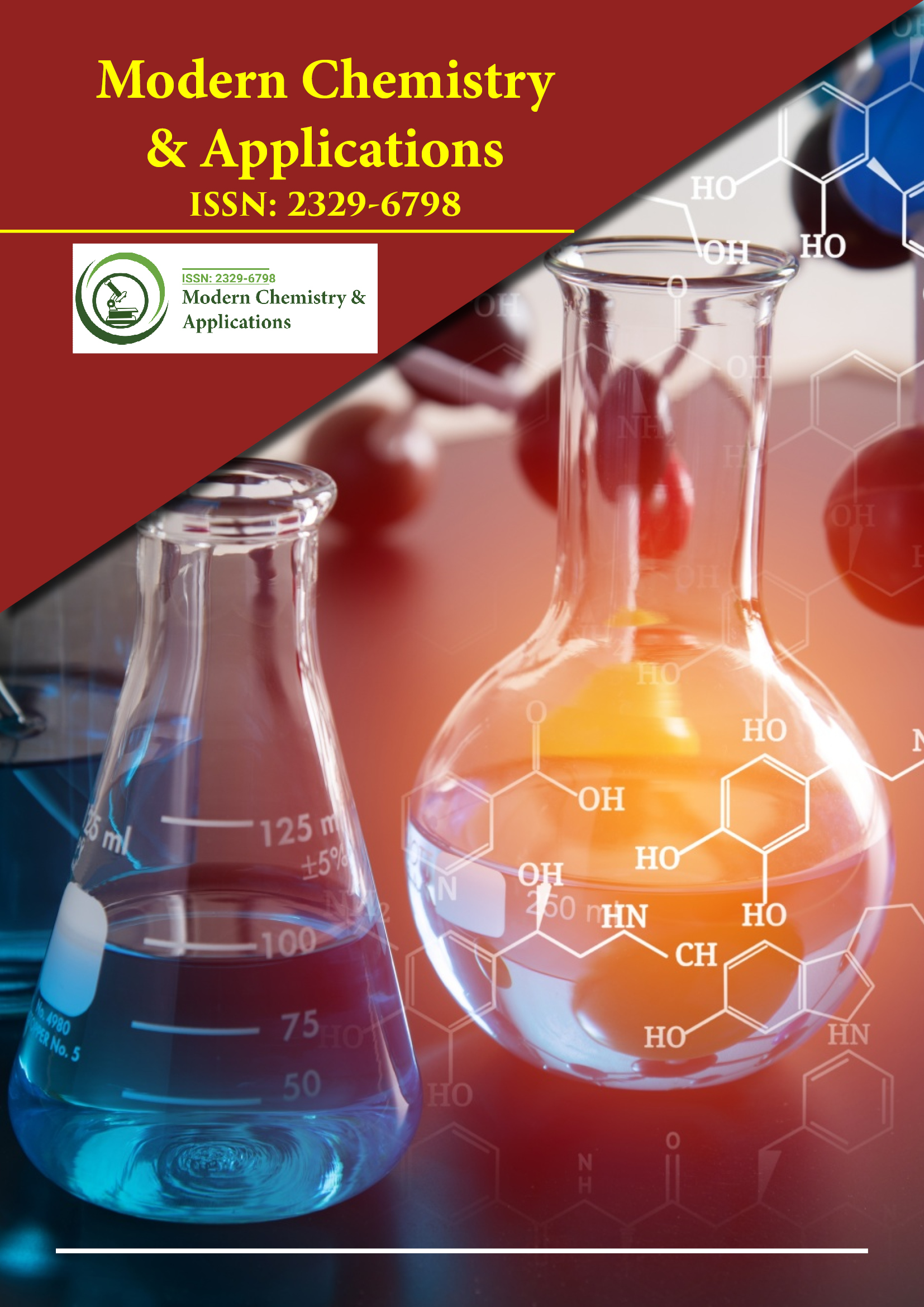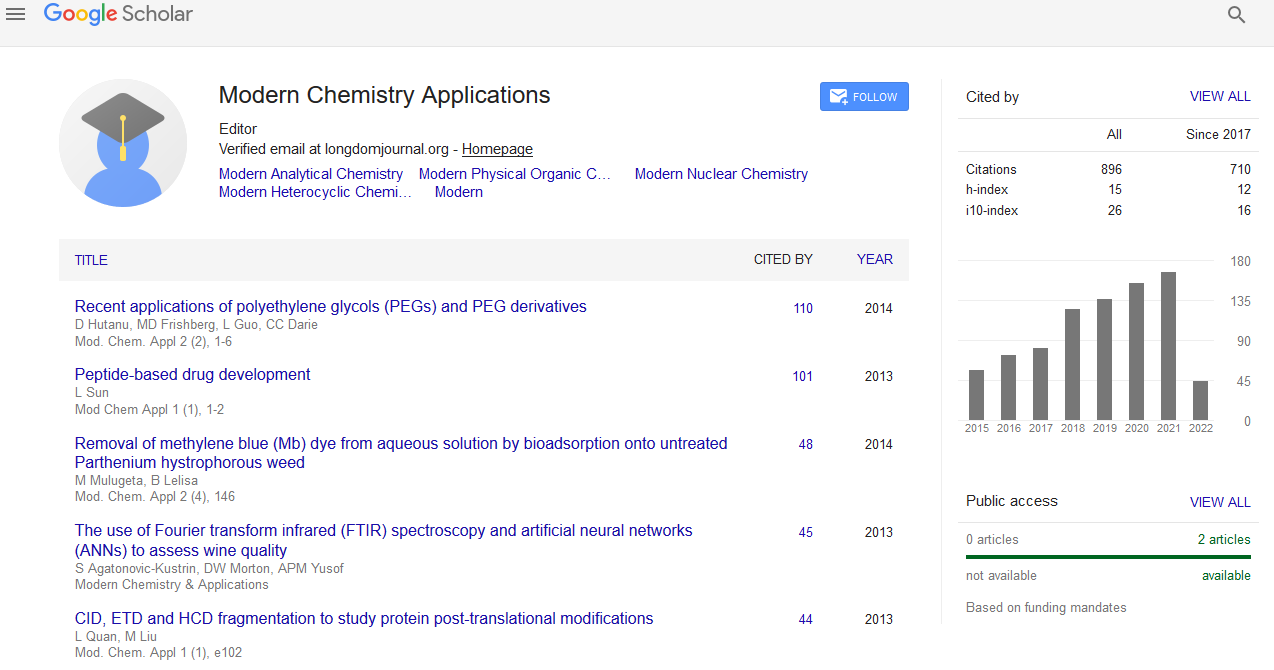Indexed In
- Open J Gate
- JournalTOCs
- RefSeek
- Hamdard University
- EBSCO A-Z
- OCLC- WorldCat
- Scholarsteer
- Publons
- Geneva Foundation for Medical Education and Research
- Google Scholar
Useful Links
Share This Page
Journal Flyer

Open Access Journals
- Agri and Aquaculture
- Biochemistry
- Bioinformatics & Systems Biology
- Business & Management
- Chemistry
- Clinical Sciences
- Engineering
- Food & Nutrition
- General Science
- Genetics & Molecular Biology
- Immunology & Microbiology
- Medical Sciences
- Neuroscience & Psychology
- Nursing & Health Care
- Pharmaceutical Sciences
Opinion Article - (2024) Volume 12, Issue 4
Advancements in Organocatalysis: Green Approaches to Efficient Carbon-Carbon Bond Formation
Li Wei*Received: 28-Nov-2024, Manuscript No. MCA-24-28407; Editor assigned: 02-Dec-2024, Pre QC No. MCA-24-28407 (PQ); Reviewed: 16-Dec-2024, QC No. MCA-24-28407; Revised: 23-Dec-2024, Manuscript No. MCA-24-28407 (R); Published: 30-Dec-2024, DOI: 10.35248/2157-7560.24.12.481
Description
Organocatalysis has emerged as a revolutionary field in the development of sustainable chemical processes. By utilizing organic compounds as catalysts, researchers are finding efficient and environmentally friendly methods to drive chemical reactions, especially those that involve the formation of carboncarbon bonds. This is particularly important because carboncarbon bond formation is a fundamental aspect of many synthetic pathways in organic chemistry, often used in the production of pharmaceuticals, plastics and agrochemicals. With the increasing demand for greener processes, organocatalysis has proven to be a valuable alternative to traditional methods, which often rely on precious metals or harsh reagents. One of the most significant advancements in organocatalysis is the development of highly selective catalysts for carbon-carbon bond formation. This has allowed for the synthesis of complex molecules in a more controlled and efficient manner.
Organocatalysts can be designed to target specific functional groups in substrates, guiding the formation of the desired carbon-carbon bonds with high precision. This has opened up new possibilities in the synthesis of pharmaceuticals, where the creation of complex molecular structures with high stereocontrol is often a critical requirement. Furthermore, the use of organocatalysts allows for the avoidance of byproducts that are typically generated in metal-catalyzed reactions, which can be difficult to separate and can complicate the purification of the final product. In addition to asymmetric synthesis, another important application of organocatalysis is in the field of polymerization. The ability to efficiently form carbon-carbon bonds is a key requirement in the production of polymers, which are used in everything from packaging materials to medical devices.
Traditional polymerization methods often involve the use of metal catalysts, which can be expensive and difficult to recycle. Organocatalytic polymerization, on the other hand, offers a greener and more sustainable alternative, using organic molecules to catalyze the formation of long chains of polymers under mild conditions. This approach has the potential to reduce the environmental impact of polymer production and open up new avenues for creating polymers with novel properties. The field of organocatalysis has also benefited from the development of more efficient catalytic systems. One example is the use of bifunctional catalysts, which contain two different functional groups that work together to catalyze a reaction. This strategy allows for the activation of substrates in multiple ways, making the reaction more efficient and selective.
Bifunctional organocatalysts have been successfully applied to a wide range of reactions, including those that involve carbon-carbon bond formation. These catalysts can promote reactions that would otherwise require multiple steps or harsh conditions, streamlining the process and reducing the overall environmental impact. While organocatalysis has made significant strides, challenges remain in the development of catalysts that can operate efficiently at industrial scales. Many of the catalysts that have been developed in the laboratory still need to be optimized for use in large-scale production. Additionally, the synthesis of organocatalysts can sometimes be complex and expensive, which can limit their widespread adoption. Nevertheless, the field continues to advance, with researchers working to develop new catalysts that are both cost-effective and efficient. Looking forward, the continued development of organocatalysis holds great potential for the creation of more sustainable and efficient chemical processes.
In conclusion, to improve the design of organocatalysts and explore new reaction mechanisms, the scope of organocatalysis will expand, offering even more opportunities for the green synthesis of complex molecules. The ability to form carbon-carbon bonds efficiently and selectively, without relying on toxic metals or harsh conditions, makes organocatalysis a vital tool in the drive toward greener and more sustainable chemistry. With further advancements, organocatalysis will undoubtedly play an increasingly important role in the development of eco-friendly processes in various industries, from pharmaceuticals to materials science.
Citation: Wei L (2024). Advancements in Organocatalysis: Green Approaches to Efficient Carbon-Carbon Bond Formation. Modern Chem Appl. 12:481.
Copyright: © 2024 Wei L. This is an open access article distributed under the terms of the Creative Commons Attribution License, which permits unrestricted use, distribution, and reproduction in any medium, provided the original author and source are credited.


